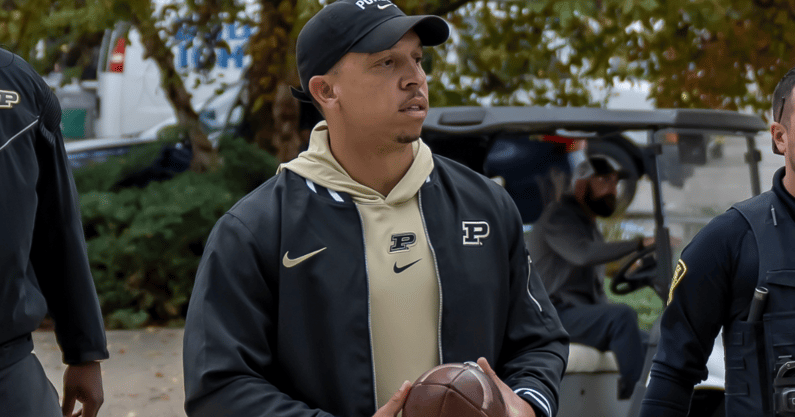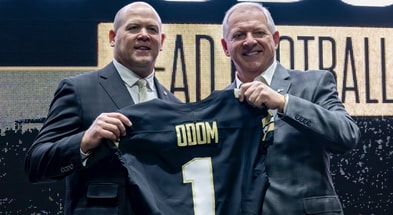Building strong collective 'priority No. 1' for Purdue coach Ryan Walters

Some coaches despise it. They can’t stand what college sports has become in the NIL/transfer portal era. But second-year Purdue coach Ryan Walters has embraced the new reality. He really has no choice.
“It is like Wall Street,” he said. “You’re buying and selling all the time. The part of my job I was not expecting to be as prioritized as it is, is the fundraising part.”
Walters is challenged–like all coaches–to maintain and build a roster year-to-year amid a landscape that has been addled by the dynamics of NIL and the transfer portal. It’s a volatile mix ripe with challenges unlike any former generation of coaches has had to manage.

“That’s priority No. 1 right now,” said Walters of helping raise money for Purdue’s collective: The Boilermaker Alliance. “If the collective has an event or function that they feel like it would be beneficial for me to speak at, I’m there. I don’t care what I’m doing, I gotta go. That’s just the nature of it.”
The Boilermaker Alliance was launched in July 2022. Since then, it has grown, adding CEO David Neff and director of operations and engagement Mady Daddario. “A year ago, we weren’t competitive in that area, and it showed,” said Walters. “We’re competitive now.”
Purdue inked a 14-man transfer portal class this offseason that rates among the best in the nation.
“We signed a top 10 class in the transfer portal and we would not have been able to sign one of those players a year ago,” said Walters. “To me, it’s crazy thinking about that now, but that’s just the nature of where we’re at. And so it is a huge priority. It’s a priority because that’s just the nature of the landscape right now.”
Coming off a 4-8 debut, Walters knows his job depends on his ability to retain and attract talent.
“I would say this,” said Walters. “Because of this university and because of the people that are in this building, not one of the players that we signed were we the school with the highest amount allotted to the collective for NIL. But, we were able to get in the conversation. And when you’re able to get in the conversation, and you get guys to actually come and visit West Lafayette, they see all the things I have fallen in love with in the last year.”
It also is vital to retain elite talent. Purdue saw its top wideout (Deion Burks) and its best defensive player (Nic Scourton) exit via the portal after last season.
“One, you can’t take things personal (when a player leaves) as a coach in today’s day and age,” said Walters, who saw 26 players enter the portal this offseason. “Two, you have to be able to wash your hands and move on. And three, you got to be able to adapt and adjust.
“I think we’ve been able to do that with a team that went 4-8 and still were able to get top 10 in the transfer portal rankings, top 30 in high school rankings. That doesn’t just happen by accident. It’s because we’ve been strategic, we’ve adapted and we’ve embraced the landscape and the calendar that is college football.”
Top 10
- 1Breaking
Boo Carter
Transfer portal rumors no more
- 2
Greg Gumbel
Legendary broadcaster passes
- 3New
Squirrel White
Tennessee WR plans to enter transfer portal
- 4Hot
Saban rips Ohio State fans
'They need to go get therapy'
- 5
Harold Perkins
LSU announces decision on 2025
Get the On3 Top 10 to your inbox every morning
By clicking "Subscribe to Newsletter", I agree to On3's Privacy Notice, Terms, and use of my personal information described therein.
One of the key players who stayed after a breakout season was safety Dillon Thieneman, a freshman All-American.
“He’s gonna need some NIL, because there’s gonna be a lot of schools that offer him probably more than we can we can offer, you know what I mean? Retention is huge and you just never know who’s gonna go into the portal from our school and from others.
“So, you want to be prepared from that standpoint. I think that’s the challenge. It’s hard to plan because you don’t know what’s going to happen until it happens, much like Wall Street, right? You have your assumptions and your intuition on who you think might enter the portal or who you think is gonna stay. But until that portal window closes, you don’t really know.”
How is it decided which players are signed to Boilermaker Alliance contracts and how much they will be paid?
“Every school kind of does it different,” said Walters. “What we do works for us. I will say it’s very strategic. There aren’t negotiations, there aren’t bidding wars. We have a system and it’s calculated about what allotments go where, and that comes from the collective.
“The collective is separate from the university, and I’m part of the university so I’m not part of the collective. I can help fund raise for the collective. But, ultimately, the collective is who divvies out the contracts for our players, and it’s a non-profit. So, our guys have to do some community service in order to receive NIL payment and so they’ve worked it out through the collective.”
Walters work in the portal never ends. A second portal window will open April 16-30.
“The Monday after the spring game, the portal is going to open,” he said. “And so you want to have allotments in your collective to be able to attract guys who want to come play on your roster and to be able to retain guys.”
Quotes for this story were transcribe from an interview conducted by The Boilermaker Alliance (membership information here). Boilermaker Alliance CEO David Neff appeared on ‘Gold and Black LIVE’ on Friday, March 1. Link to the interview

























